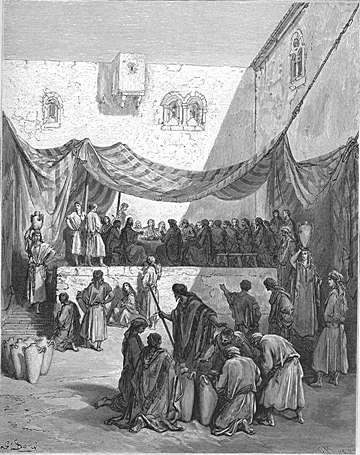John 2
1 And on the third day, a wedding was held in Cana of Galilee, and the mother of Jesus was there.
Keezl aawots Gelil datsatse fa'a K'aana eteef kittutse jiwo fa'e b́tesh, Iyesus induwere manokna btesh.
2 Now Jesus was also invited to the wedding, with his disciples.
Mank'o Iyesusnat b́danifuwotswor jiwok s'egerno.
3 And when the wine was failing, the mother of Jesus said to him, “They have no wine.”
Jiwumanatsnowere weyniwon dutsets biro b́s'utsok'on Iyesus ind Iyesussh, «Weyini bironiye boshirotse s'uure!» biet.
4 And Jesus said to her: “What is that to me and to you, woman? My hour has not yet arrived.”
Iyesuswere «Nee máátsune! eegishe t keewots n kindiri? Ti aawo borafa'ee» bí et.
5 His mother said to the servants, “Do whatever he tells you.”
Manoor b́ ind manoke fa'uwotssh, «Bí itsh b́ ettso k'alwere» bí eti.
6 Now in that place, there were six stone water jars, for the purification ritual of the Jews, containing two or three measures each.
Bonemok'on ayhudiwots bo s'ayinf niwa b́ teshtsotse shirt shútsi kunduwots manoke fa'ano, kunduwtsuwere bo ik ikets wee gito wee keez kor atso detso falitkno.
7 Jesus said to them, “Fill the water jars with water.” And they filled them to the very top.
Iyesus guutswotssh «Kundwotsits atso s'eentswere» bí et, boowere bo nonots b́ borfestsosh s'eentsbok'ri.
8 And Jesus said to them, “Now draw from it, and carry it to the chief steward of the feast.” And they took it to him.
Maniye hakon Iyesus guutsuwotssh, «Ereer eshe and! jiwo doonzsh tepde'er imere» bí et, boowere dek'amt bísh boimi.
9 Then, when the chief steward had tasted the water made into wine, since he did not know where it was from, for only the servants who had drawn the water knew, the chief steward called the groom,
Jiwo doonz weyini biro maants wonets aatso b́ nonots b́gedtsok'on, ewuke b́waatsok'o danatse, ernmó aats kitts guutsuwots danfno, jiwo doonz, guuyo s'eegdek't hank'o bíet,
10 and he said to him: “Every man offers the good wine first, and then, when they have become inebriated, he offers what is worse. But you have kept the good wine until now.”
«Ash na'i nemok'on ash jamo shin biri komo shin imr s'eegets asho b́ woriyakon il c'ic'o b́ t'intsfoni, nemon weyini biro sheengo andish b́ borfetso nbeezi.»
11 This was the beginning of the signs that Jesus accomplished in Cana of Galilee, and it manifested his glory, and his disciples believed in him.
Iyesus adits jam keewwotsitsi shints wotts han Gelil dats kitu K'anitse b́ fini, eshe mank'oon b́mango b kitsi, b́ danifwotswere bín boamani.
12 After this, he descended to Capernaum, with his mother and his brothers and his disciples, but they did not remain there for many days.
Maniye hakon b́ indnat b́ eshwotsnton, b́ danifuwotsnton K'frnahom maants b́o oot'i, ernmó manoke ay aawo teyatsno.
13 And the Passover of the Jews was near, and so Jesus ascended to Jerusalem.
Ayhudiwots fazigi baaliyo b́ bodtsotse Iyesus Iyerusalem maantsan bíami,
14 And he found, sitting in the temple, sellers of oxen and sheep and doves, and the moneychangers.
Ik' mootse minzwotsi, mererwotsnat kurkund kemirwotsnat gizo wonirwotsi bedek't bokeewefero bokeemfero boon b́ daatsi.
15 And when he had made something like a whip out of little cords, he drove them all out of the temple, including the sheep and the oxen. And he poured out the brass coins of the moneychangers, and he overturned their tables.
Manoor joki k'ac'eyo dooz dekt ash jamwotsi, bo mereruwotsnat bo minzwotsnton Ik' móótse b́ kish, bogizo wonirwots giz mano b́ bad'iyi, bomarono b́ gup'shi.
16 And to those who were selling doves, he said: “Take these things out of here, and do not make my Father’s house into a house of commerce.”
Kurkund kemiru ashuwotssho «Jaman okaan de'e ameree! t nih móó jaaki móó wosh k'ayere!» bíet.
17 And truly, his disciples were reminded that it is written: “Zeal for your house consumes me.”
Manoor b́ danifwots, «N maa jangosh okooro tawok'o taan mitsre» ett guut'etso gaw bodek'i.
18 Then the Jews responded and said to him, “What sign can you show to us, that you may do these things?”
Maniye hakon Ayhudi naash naashuwots Iyesusi, «Nee hank'o k'alosh alo n detstsok'osh n kitsit adits keewo eebi noosh n kitsiti?» boet.
19 Jesus responded and said to them, “Destroy this temple, and in three days I will raise it up.”
Iyesuswere, «Ik' man gah k'rore taa keez aawotse aaniy aak'ritwe» bí et.
20 Then the Jews said, “This temple has been built up over forty-six years, and you will raise it up in three days?”
Bowere, «Ik' maan agosh habe shrt nato ishre, Eshe nee keez aawotse aanik'riti?» boeti.
21 Yet he was speaking about the Temple of his body.
Iyesusmó «Ik' maa» ett b́ keewtso bí atsi janga b́ tesh.
22 Therefore, when he had resurrected from the dead, his disciples were reminded that he had said this, and they believed in the Scriptures and in the word that Jesus had spoken.
Manatse tuutson Iyesus k'irotse b́ tuutsok'on b́ danifwots man keewt b́teshtsok'o gawbodek', mann S'ayin mas'aafotse guut'etsonat Iyesus b́ keewts keewo bo amani.
23 Now while he was at Jerusalem during the Passover, on the day of the feast, many trusted in his name, seeing his signs that he was accomplishing.
Ieyesus Fazig baliwor Iyerusalemitse b́bewor b́ finits adits keewwotsi bobek'tsotse ay ashuwots bin boamani.
24 But Jesus did not trust himself to them, because he himself had knowledge of all persons,
Iyesusmó ash jamwotsi b́ dantsotse boon amaneratse,
25 and because he had no need of anyone to offer testimony about a man. For he knew what was within a man.
Bí ash nibotse fa'a jamo b́ dantsosh ash jango konwor bísh b́ keewitwok'o geeraka.





















